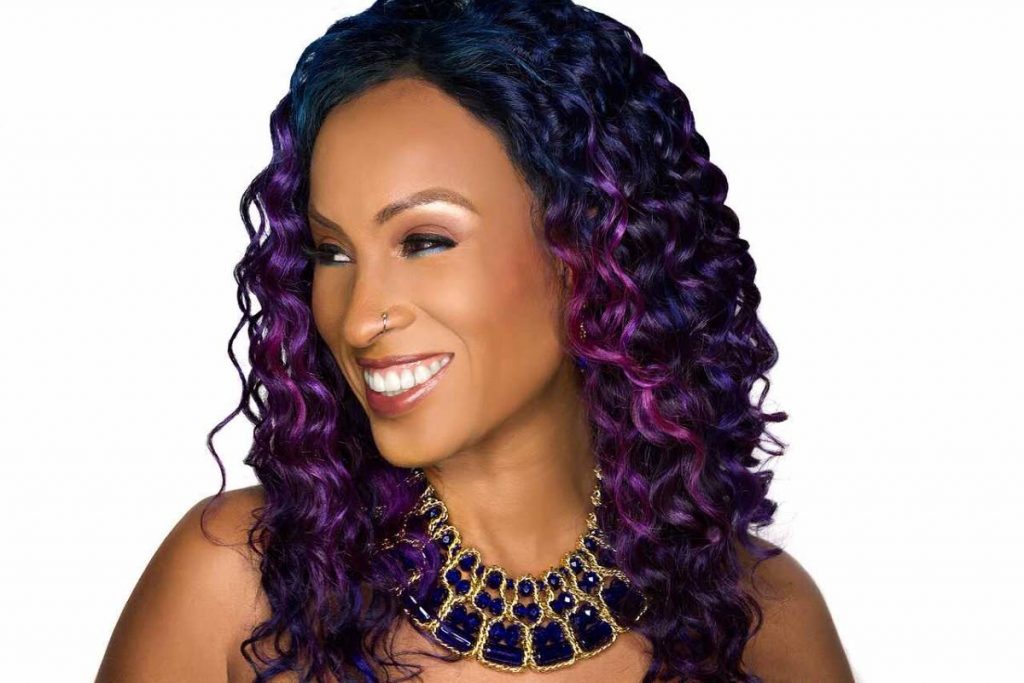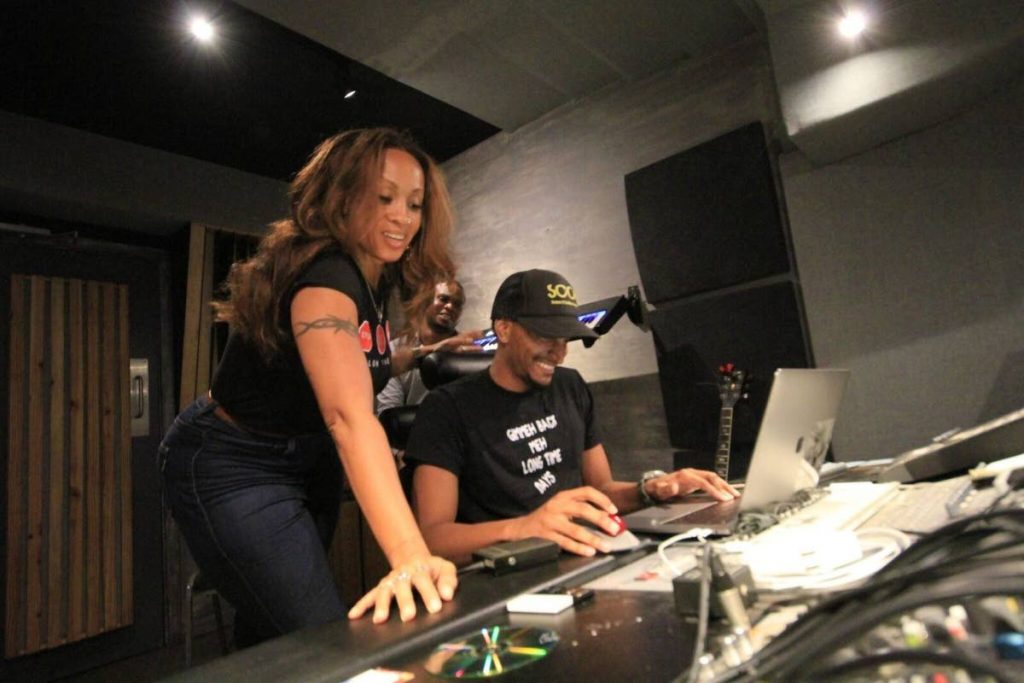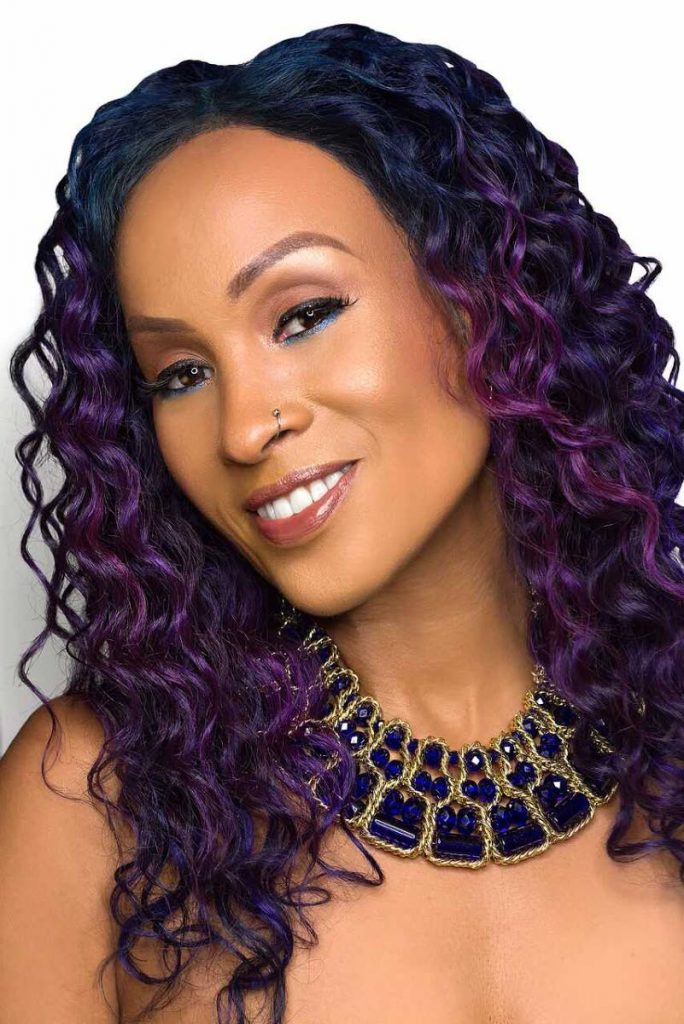Carnival in Hinds’ sight

At 47, the “queen of soca” is still at the top of her game, and back in Trinidad to record a string of 2018 songs. Newsday caught up with her to discuss selfies, SuperBlue and her inherent shyness.
As Alison Hinds reaches out to shake hands, the tattoo is obvious. Between the thumb and forefinger of her right hand, that squidgy area where a pressure point is located, she has a red and white England flag.
It’s kind of surprising. She was born in England, sure. But England tattoos are associated with beer-bellied football supporters, not stylish soca divas.
On her left hand, in the identical spot, another tattoo – the blue and yellow of the Barbados flag. Around her neck is a gold chain in the shape of the Bajan trident.
This is a lot of national symbolism. Clearly where she’s from is a big part of her identity. In Trinidad there’s so much overt nationalism – particularly the omnipresent flag – that perhaps foreigners, especially artists, feel a need to represent themselves. Hinds is even more attractive in person than in pictures. Her slightly see-through, topaz-green, loose-knit sweater matches the colour of her earrings. Her hair is a long golden weave and her tight-fitting pants accentuate her famous curves.
Does she always look this good, or just for Carnival season? “I’m touring all year, so...” she says, by way of explanation. “Especially this year. There was a point when I was in the US literally every weekend for three months.”
Endless gigging alone must keep her in shape – she’s not kidding about that live schedule, this year she even played a carnival in Phoenix, Arizona – but she also has a personal trainer back home.

There’s a whole world of soca fetes beyond Trinidad and Tobago, and Hinds seemingly plays them all.
“When you go to places where the diaspora’s spread out, far flung, and someone like myself comes, it’s going to draw (Caribbean expats) from everywhere. Some places don’t get it often, it’s not like in New York or Toronto with a huge concentration of West Indians and always stuff going on.”
It sounds like a fun job she has, but there’s a lot of hard work involved, for her and her team. In Trinidad to record her 2018 Carnival releases – including a mystery collaboration with a major artist out next week – she is also fitting in a packed promotional schedule of live television interviews and radio appearances. In the new year she’ll perform at multiple fetes, including Tribe, Fantasy, Caesar’s Army and Brian Lara’s party.
It’s all a far cry from Plaistow, the distinctly unglamorous suburb of east London where Hinds grew up in the 1970s. She recalls how the local shop owners would board up their windows on Saturdays when West Ham United hooligans would turn up looking to smash up the high street.
“It was openly racist. That was my experience as a kid: walking the street and someone would call out ‘golliwog’. And I was a very introverted kind of kid. Very shy, painfully so.”Surely she’s not still an introvert? All that wining and grinding.
“To a point, yes.” she says. “Doing what I do now has allowed me to build up confidence. When I’m onstage I can do that, but I cherish my privacy. I’m still like that at the core. I’m very happy to be in a room by myself watching Netflix or reading.”
On stage, however, she says she’s very much in control, to the point where fans, especially male fans, are intimidated by her stage persona.

At home in St James, Barbados she inhabits another role again: the mother of a 13-year-old daughter, she gets up at 5 am, does the school run, the weekly food shop and everything else that domesticity entails. Her daughter is a little older than Hinds was when her mother took her to Barbados on their annual summer holiday and told her they weren’t going back to London. Ever. Hinds was ecstatic. Each year, she says, she would cry when it was time to go back to Plaistow, leaving behind family and the kids from the local neighbourhood who would, astonishingly to a Londoner, walk barefoot on the hot melting tarmac.
Her Bajan mother, who arrived in London as a nurse, then retrained as a secretary when Hinds was born, met her father, also from Barbados, while he was working at the Ford Motors assembly plant in Dagenham.
“My father passed away four years ago. He had prostate cancer,” she says in sad tones. “He left Barbados as a teenager and never returned until he came to give me away at my wedding.
“My dad was a compulsive gambler. Horses, dogs, the (football) pools, everything. When I didn’t know where to find my dad, I’d go in the betting shop and that’s exactly where he’d be. My mother had tried and tried to help him, but he didn’t want to admit he had a problem.”
Once Hinds finished primary school, her mother – who was keeping the family together financially – decided enough was enough and relocated with her 11-year-old daughter.
At 16, Hinds joined a band called Square One and her singing career took her from playing at tourist hotels to eventually becoming an international soca star. She talks about the mid-90s era, when she first came to Trinidad, and about SuperBlue’s astonishing 1996 Soca Monarch Finals performance and stage invasion, which we’d both recently watched on YouTube.
“It was absolute pandemonium before his name was even called. The entire place jumping, every last soul in there,” she says excitedly. “Before social media, people went to a fete to fete. There was no Snapchat, Instagram and ‘selfy-ing’. You’re going in the party to have a good time and when you finish you’re pouring sweat. People party in a different kind of way now. Everything is social-media-driven. Put away the phone. Connect to where you are.”
And with that twinge of nostalgia and a warning to all feters everywhere, Hinds is out. She has an evening recording session at BadJohn Republic studios in Palmiste with Keegan Taylor (who wrote her latest release, Pull Up) and producer Kyle Phillips.
There’s no rest for the wicked, or the queen of soca.
For Alison Hinds live bookings, contact perceptionmanagement2015@gmail.com

Comments
"Carnival in Hinds’ sight"